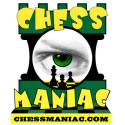Google Video About Deep Blue Match With Garry Kasparov
In February 1996, IBM's chess computer Deep Blue defeated Kasparov in one game using normal time controls, in Deep Blue - Kasparov, 1996, Game 1.[View Games] However, Kasparov infamously retorted that upon the next games he "would tore Deep Blue to pieces with no question." and proceeded to with 3 wins and 2 draws, soundly winning the match.
In May 1997, an updated version of Deep Blue defeated Kasparov in Deep Blue - Kasparov, 1997, Game 6, in a highly publicised six-game match. This was the first time a computer had ever defeated a world champion in match play. An award-winning documentary film was made about this famous matchup entitled Game Over: Kasparov and the Machine. Also, IBM keeps a web site of the event at http://www.research.ibm.com/deepblue/. It should be noted that several factors weighed against Kasparov in this match. He was denied access to Deep Blue's recent games, in contrast to the computer's team that could study hundreds of Kasparov's. The relatively fast time control, lack of rest days and other match rules also favored the machine.
After the loss, Kasparov said that he sometimes saw deep intelligence and creativity in the machine's moves. He suggested that humans may have helped the machine during the match. In a way, Kasparov's allegations were correct. The rules provided for the developers to modify the program between games, an opportunity they used to shore up weaknesses in the computer's play revealed during the course of the match. Kasparov demanded a rematch, but IBM declined and retired Deep Blue.
Kasparov has been credited with the invention of Advanced Chess in 1998, a new form of chess in which a human and a computer play together.
In November 2003, he engaged in a four game match against chess playing computer program X3D Fritz (which was said to have an estimated rating of 2807), using a virtual board, 3D glasses and a speech recognition system. After two draws and two wins respectively, the X3D Man-Machine match ended in draw. Kasparov received $175,000 for the result and took home the golden trophy. Kasparov continued to criticize the blunder in the second game that cost him a crucial point. He felt that he had outplayed the machine overall and played well. "I only made one mistake but unfortunately that one mistake lost the game."
text is available under the GNU Free Documentation License
wikipedia.org



















1 Comments:
I believe Kasparov's argument was considerably specific that mentioned in the article. In particular, he and a lot of other grandmasters, for example, Yasser Seirawan noted that one particular move from the second game of the match was very uncomputer like. That is, no computer since then (even one's stronger than deep blue), were able to come up with White's 24th move Be4. The IBM team said they gave the computer a strong program from king protection which accounts for this. However, the computer later in the same game (59th move) moved it's king toward the middle of the board allowing Kasparov a draw (which he missed, resigning in a drawn position). Giving other programs a strong king protection profile didn't allow them to derive the move either and nor did IBM's predecessor to Deep Blue was able to find the move so the issue is how that particular move.
I suspect that Kasparov played whole line as home preparation and was very surprised when the computer did play like his Fritz computer which ranks the moves remarkably different than Deep Blue did. So what it the truth? I don't know but is a very interesting debate.
I found it entertaining to check this all out with my Fritz8 computer, which can't find the correct move in this position.
Kasparov - DEEP BLUE, Philadelphia, Game 2, 11 Feb 96
1. Nf3 d5 2. d4 e6 3. g3 c5 4. Bg2 Nc6 5. O-O Nf6 6. c4 dxc4 7. Ne5 Bd7 8. Na3 cxd4 9. Naxc4 Bc5 10. Qb3 O-O 11.Qxb7 Nxe5 12. Nxe5 Rb8 13. Qf3 Bd6 14. Nc6 Bxc6 15. Qxc6 e5 16. Rb1 Rb6 17. Qa4 Qb8 18. Bg5 Be7 19. b4 Bxb4 20.Bxf6 gxf6 21. Qd7 Qc8 22. Qxa7 Rb8 23. Qa4 Bc3 24. Rxb8 Qxb8 25. Be4 Qc7 26. Qa6 Kg7 27. Qd3 Rb8 28. Bxh7 Rb2 29. Be4 Rxa2 30. h4 Qc8 31. Qf3 Ra1 32. Rxa1 Bxa1 33. Qh5 Qh8 34. Qg4 Kf8 35. Qc8 Kg7 36. Qg4 Kf8 37. Bd5 Ke7 38. Bc6 Kf8 39. Bd5 Ke7 40. Qf3 Bc3 41. Bc4 Qc8 42. Qd5 Qe6 43. Qb5 Qd7 44. Qc5+ Qd6 45. Qa7 Qd7 46. Qa8 Qc7 47. Qa3+ Qd6 48. Qa2 f5 49. Bxf7 e4 50. Bh5 Qf6 51. Qa3+ Kd7 52. Qa7 Kd8 53. Qb8+ Kd7 54. Be8+ Ke7 55. Bb5 Bd2 56. Qc7+ Kf8 57. Bc4 Bc3 58. Kg2 Be1 59. Kf1 Bc3 60. f4 exf3 61. exf3 Bd2 62. f4 Ke8 63. Qc8+ Ke7 64. Qc5 Kd8 65. Bd3 Be3 66. Qxf5 Qc6 67.Qf8+ Kc7 68. Qe7+ Kc8 69. Bf5+ Kb8 70. Qd8+ Kb7 71. Qd7+ Qxd7 72. Bxd7 Kc7 73. Bb5 1-0
For an interesting analysis of this position go to http://www.chessbase.com/columns/column.asp?pid=146
As far as I know, no one, even with the stronger playing programs today, has managed to get a chess computer to find the 36th and 37th moves. This is the essence of the argument.
Post a Comment
<< Home